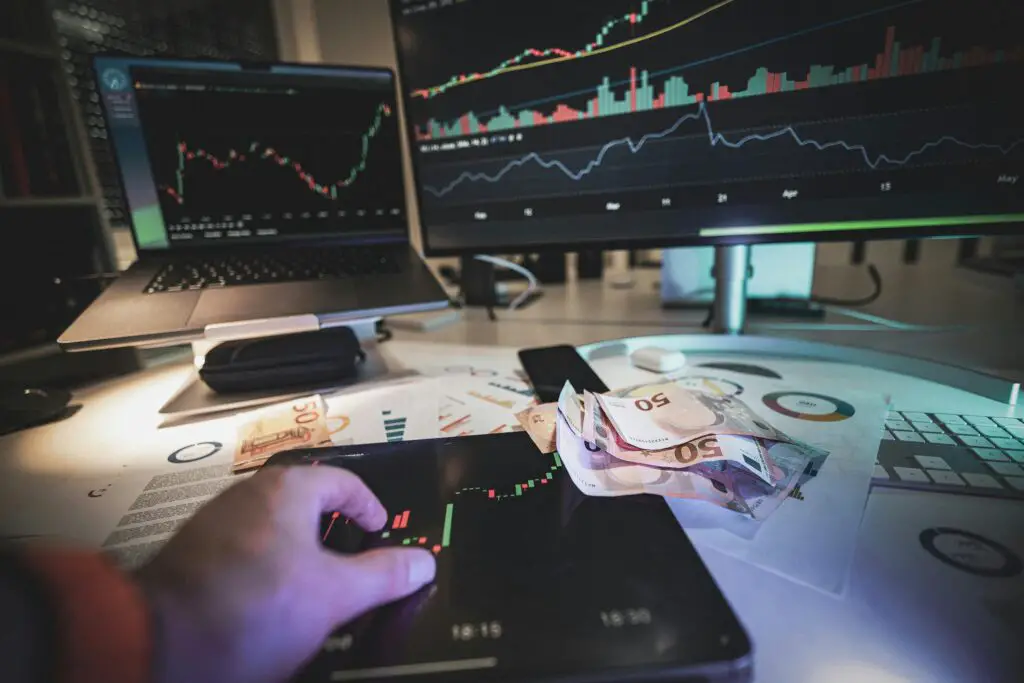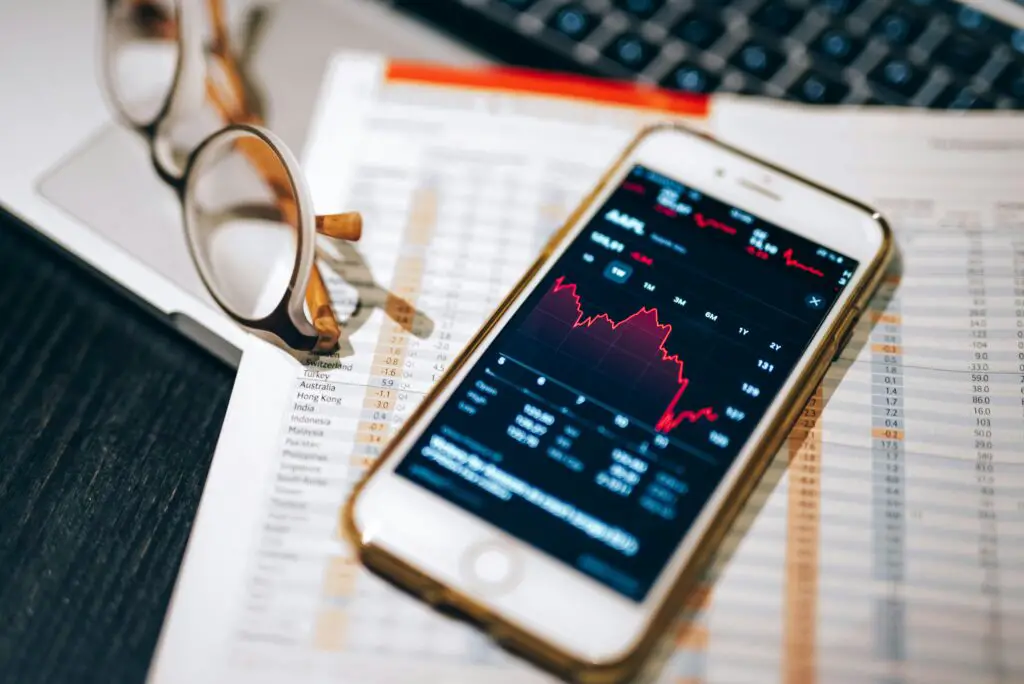Stock trading is the acquisition and disposal of shares of publicly listed firms. Purchasing stock gives you the opportunity to profit from the company success while effectively owning a small portion of it.
The workings of the stock market
Stock trading takes place on centralized exchanges like the NASDAQ or the New York Stock Exchange. These exchanges are usually available for business from nine in the morning to four in the afternoon EST. Stock markets are not open continuously like the Forex market.
Stock types include penny stocks and blue chip stock markets
There exist other categories of stocks, such as growth stocks, penny stocks, and blue chip companies, which are comparatively inexpensive shares of widely recognized corporations. Every variety has a unique profile of rewards and risks.

Market Capacity and Openness
Comparison of Market Size
The Forex Market:
The largest and the majority of liquid financial market in the world is the market for foreign exchange. More than six billion dollars is traded on average daily, more than any other financial exchange. The market enormous size can be due to its worldwide reach and the ongoing necessity for currency exchange for speculative, investment, and international trade. The Forex market is driven by major financial hubs like London, New York, Tokyo, and Sydney, which enables it to run around the clock, five days a week.
The market for Stocks:
In comparison, the Forex market is larger than the global stock market despite its significant size. It is estimated that the total market valuation of all companies listed on international stock exchanges is approximately $95 trillion. This market is heavily influenced by major stock exchanges such as the Tokyo Stock Exchange, NASDAQ, and New York Stock Exchange. In contrast to the Forex market, stock trading typically limits itself to certain exchange trading hours.
Forex compared Stock Market Liquidity
Forex liquidity:
Because of the enormous size of the Forex market, traders can readily enter and exit positions without significantly affecting price fluctuations due to the market’s tremendous liquidity. Because they are quite liquid, the major currency pairs EUR/USD, USD/JPY, and GBP/USD allow for tight spreads and little downtime. The Forex market is appealing to regular and institutional traders due to its high liquidity, making it possible to complete huge deals quickly.
Market liquidity for stocks:
The liquidity level in stock markets depends upon the particular stock and the state of the market. Stocks with large caps typically offer significant liquidity, such as established companies with high trading volumes. These stocks are easily bought and traded without substantially impacting the stock price. On the other hand, companies with smaller market values or lower trading volumes may exhibit reduced liquidity, resulting in broader spreads between bids and requests and possible fluctuations in price. Additionally, market liquidity may change daily due to news about the economy or market developments.
Accessibility and Trading Hours
Trading Hours for the Forex Market
24 Hour Market:
One of the most significant benefits of the Forex market is its accessibility at all times. The Forex market is open for business five days a week, from Mondays am in Asia and the Pacific until Friday late in the United States. Because it is a decentralized market over the counter that lacks a central exchange, this continuous trading is made feasible.
Important Trading Days:
The main trading sessions on the Forex market are separated by the business hours of the major financial hubs worldwide.
Sydney Meeting:
It begins at approximately 10 PM GMT, signaling the start of the trading week. While it is the most volatile session, traders interested in Australian and New Zealand dollars should pay attention to it.
Tokyo Meeting:
It starts at approximately midnight in GMT. Japan, China, and other Asian nations participate in what is referred to as the Asian session. The most active currency pairs involve the Japanese yen.
London Meeting:
Opening at approximately 7 AM GMT is one of the most important sessions because of London prominence as a worldwide financial center. The early Asian and later New York sessions overlap, creating more volatility.
The session in New York:
It begins at approximately 12:00 GMT and ends on the same day as the London session. Around this time, high trade volumes and volatility are expected, mainly when significant US economic data is released.
Availability:
The Forex market is open 24/7, giving traders the freedom to trade whenever it fits into their schedule. Those who trade temporarily and may have other responsibilities would especially benefit from this. Furthermore, because of Forex global reach, traders may respond instantly to news and events no matter where they are.
Margin and Leverage
Using leverage when trading forex
High leverage is a common feature of forex brokers, enabling traders to manage sizable positions with relatively little capital. This could lead to greater earnings, but it also increases the risk of experiencing big losses.
Using leverage while trading stocks
Although it is typically less than in Forex trading, leverage is present in stock trading. Although margin accounts let traders borrow money to purchase stocks, the level of leverage can often be limited by rules.
Hazards connected to leverage
Leverage can increase earnings but also result in significant losses, particularly in erratic markets. Traders need to utilize leverage sensibly and be aware of the hazards.

Risk and Volatility
Forex trading volatility
Geopolitical developments, market mood, and economic data can all significantly impact the volatility of forex markets. For traders, this volatility offers both opportunities and threats.
Trading in stocks can be volatile
The stock market volatility varies according to the firm, industry, and overall state of the economy. Sharp price swings can occur in stocks, especially before or after earnings reports or significant news events.
Techniques for risk management
Effective risk management is important in both markets. To control risk and protect their investments, traders employ diversification, stop loss orders, and position sizing.
Trading Expenses
Forex spreads and commissions
The primary cost of trading forex is the spread, or the disparity between the demand and offer prices. While brokers sometimes charge commissions, they are usually less than in stock trading.
Fees and commissions related to stock trading
Commissions per trade are a common aspect of stock trading and might differ between brokers. Fees might also apply for data feeds, account maintenance, and other services.
Unexpected expenses and ways to reduce them
In both markets, hidden expenses may exist, such as slippage and overnight finance charges. Traders ought to be aware of these and select brokers who provide clear pricing.
Evaluation and Approaches
Fundamental comparison of stocks and Forex
Fundamental analysis in Forex focuses on macroeconomic variables like interest rates and economic indicators. Basic research in stock trading entails assessing a company’s earnings, growth potential, and financial stability.
Technical analysis of stocks versus Forex
In both markets, technical analysis, which entails examining price charts and patterns, is extensively employed. Traders employ trend lines, chart patterns, and indications to help them in making informed trading decisions.
Favored trading techniques
Carry trading, scalping, and trend following are standard Forex trading techniques. Strategies for trading stocks vary from swing and day trading to long term investing.
Safety and Regulation
Control in Foreign Exchange Markets
Worldwide Regulatory Environment:
Since the Forex market is decentralized and runs naturally, all transactions are not supervised by a central exchange or other regulatory organization. As a result, laws governing the Forex market differ significantly between nations. The regulatory bodies supervising Forex brokers and trading operations inside national borders are in several countries.
Important Regulators:
Americas:
The National Futures Association and the Commodity Futures Trading Commission are the leading regulatory organizations. To protect traders, they impose strict limits on leverage, capital restrictions, and transparency.
Britain:
The Financial Conduct Authority supervises Forex brokers and makes sure they follow stringent guidelines for reporting, client money protection, and behavior.
European Union:
National regulators in every EU member state supervise forex brokers operating within their borders. The European Securities and Markets Authority created regulatory criteria for leverage limitations and risk alerts.
Australia:
The Australian Securities and Investments Commission supervises Forex trading and brokers and ensures that rules meant to protect traders are followed.

Japan:
In order to protect retail traders, the Financial Services Agency supervises Forex trading with an emphasis on transparency and leverage limitations.
Legal prerequisites:
Regulated Forex brokers have several obligations, such as:
Dividend Payments to Clients:
To prevent misuse, brokers must keep client funds and operating assets apart.
Sufficient Capital:
A minimum capital requirement is placed on brokers to ensure they can fulfil their financial commitments.
Limits on Leverage:
In an effort to reduce the risk of substantial losses, regulations often limit the amount of leverage brokers can provide typical clients.
Transparency and Reporting:
Financial statements and details about customer funds are among the reports that regulated brokers are required to submit regularly to regulatory bodies.
Safety Issues:
Forex trading can still be risky even with rules in place, especially when dealing with unregulated or international firms. Unregulated brokers might not provide as much safety as regulated ones, and traders might be at risk from dishonest trading tactics, inadequate fund security, and possible fraud. Selecting brokers who hold a license and are subject to regulation by credible agencies is important for traders.
Capital Needs
The required minimum capital to trade Forex
Because of leverage, forex trading often needs less initial cash. However, because losses can quickly drain funds, starting with a tiny account may raise risk.
The required minimum capital to trade stocks
More money is usually needed for stock trading, especially for dedicated or day traders. Margin accounts may also have minimum account balance requirements.
How capital affects trading decisions
The amount of capital you have affects your trading decisions, including the markets you trade, the size of your holdings, and your risk tolerance.
Aspects Psychological
Emotional difficulties when trading Forex
Forex trading fast paced environment can cause emotional problems such as greed and terror. Maintaining discipline and maintaining your trading plan are important.
Emotional difficulties when trading stocks
Additionally, stock trading can be emotionally draining, particularly during market turbulence. It is important to maintain calmness and avoid acting rashly or emotionally motivated.
Advice for preserving psychological discipline
Be patient, set reasonable goals, and take pauses as needed. Keep a journal to track your development and draw lessons from your experiences.
Tax Impacts
Forex profit taxes
Capital gains tax is generally applied to profits from forex trading, though the exact rules could differ by nation. Section 1256 contracts and ordinary gain/loss treatment are the two tax treatment options available to Forex traders in the United States.
Income taxes on stock gains
Profits from stock trading are subject to a capital gain tax, with different rates applied to both immediate and long term gains. For tax reporting purposes, it is important to maintain accurate records of every transaction.
Reporting requirements and legal issues
Traders should speak with a tax specialist to ensure compliance with local legislation and understand their tax obligations. Accurate reporting requires proper record keeping.

Positives and Negatives
Pros and drawbacks of trading forex
Advantages:
24 hour marketplace
Low starting capital requirements
High liquidity
Cons:
Greater risk of leverage
Reduced supervision
Variability
Pros and disadvantages of trading stocks
Advantages:
Controlled marketplaces
Potential for long term investments
A selection of stocks
Cons:
Restricted trading hours
Greater initial capital needs
Market vulnerability to more general economic influences
Conclusion
Trading stocks and Forex both present unique opportunities as well as difficulties. The most suitable course of action for you depends on your trading choices, level of risk tolerance, and financial objectives. Although forex trading might be attractive to individuals seeking a volatile, continuous market with less capital needs, stock trading presents a more controlled setting with the possibility of financial gains over the long run. Regardless of the market you choose, it is important that you educate yourself, develop a solid trading strategy, and approach trading with control and responsibility.